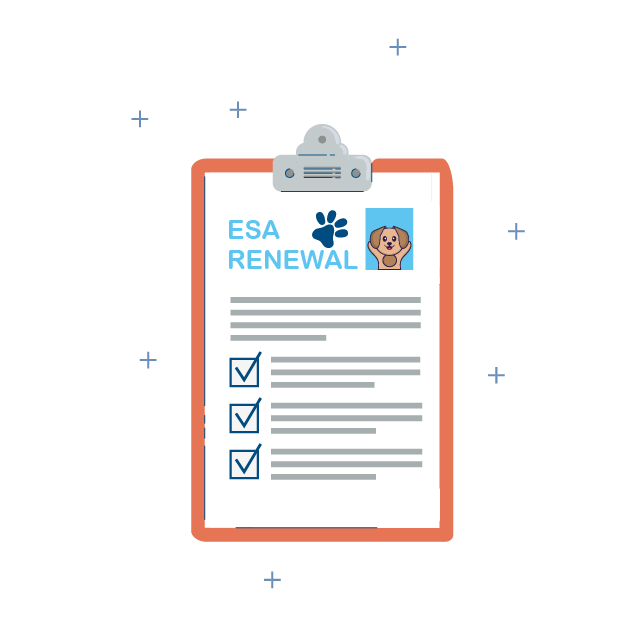Description
Discounted renewal option if you have more than one pet.
This is a yearly renewal option for the ESA Housing Letter (ESA).
If you already bought the ESA Housing letter and you need to renew your letter you can choose this Renewal Emotional Support Animal Housing.
FAQ
ESA
An emotional support animal, or ESA, is an animal companion that provides comfort and support to someone suffering from a mental or emotional disability such as depression, anxiety, post-traumatic stress disorder or a phobia. Emotional support animals and their owners have certain protections under federal and state laws. Landlords, Co-Ops, HOAs, and other housing providers must allow tenants to live with their ESAs free of charge, even if the building has a policy banning pets.
To have a valid emotional support animal, you must be in possession of a recommendation letter from a licensed health care professional (sometimes also referred to as a “licensed mental health professional” or “LMHP”). The ESA letter will establish that you have a disability and that an emotional support animal alleviates symptoms of that disability. Under federal law, this is the only legitimate way to qualify an animal companion as an emotional support animal.
A valid ESA letter is the only documentation you need in order to qualify an emotional support animal. Landlords cannot ask for a certificate, registration, license or ID, or insist that your ESA wear a vest. These items do not confer any legal status on emotional support animals. Some ESA owners use such items as tools to signal that their animal companion is an ESA, but they are not mandatory and do not function in lieu of an ESA letter as valid forms of proof for an ESA. There is also no need to register your ESA in a database or registry.
No, ESAs do not have an automatic legal right to be in grocery stores, restaurants, and hotels that prohibit animals. ESA owners have the legal right to be accompanied by their animal companion in their home pursuant to the Fair Housing Act. Only ADA service animals trained to perform tasks (such as seeing-eye dogs for the blind) have public access rights in places like grocery stores and restaurants. Some establishments such as hotels are not obligated by law to accommodate ESAs but will do so anyway as a courtesy. It is best to check with the hotel or other businesses to see if they have a policy regarding emotional support animals.
No, ESAs are not a scam. Regrettably, there is a lot of misinformation and misunderstanding on the internet when it comes to emotional support animals that puts an undeserved cloud over legitimate ESA owners and service companies. Contrary to some myths, there is a developed regulatory framework surrounding emotional support animals in the United States. ESAs are protected by federal laws and government agencies which enforce those laws. There are specific legal requirements that ESA owners must adhere to in order to obtain accommodation under law for their animal companion. Legitimate owners of emotional support animals must have documentation in the form of a recommendation letter from a licensed healthcare provider. Housing providers have the right to demand an ESA letter from the tenant before accommodating an ESA request.
There are also many legitimate emotional support animal services online such as ESADoctors.com. You should proceed with caution with any website that promises that their certification, registration, license or ID will immediately qualify your pet as an emotional support animal. Websites that are not scams will instead connect you to a healthcare professional who is licensed for your state. That professional will conduct an independent assessment of whether an ESA is right for you and issue an ESA letter only if they determine that you qualify. Legitimate ESA companies online cannot guarantee to instantly qualify an emotional support animal, since that determination must come from an independent licensed professional after evaluating the client.
PSD
A psychiatric service dog (or PSD) is a type of service dog that has been individually trained to perform tasks relating to a handler’s mental, emotional or learning disability. Psychiatric service dogs have the same rights as other types of service dogs which assist handlers with physical disabilities. Service dogs have special access rights under the Americans with Disabilities Act (ADA), Fair Housing Act and Air Carrier Access Act. They are allowed to accompany their owners in the home, on-flights and in places where members of the public are generally allowed to go.
A psychiatric service dog is not the same thing as an ESA. The primary difference between a psychiatric service dog and an emotional support animal is that a PSD must be fully trained to perform tasks relating to a disability. A PSD in training does not yet qualify as a service dog. In contrast, ESAs are not required to have any specialized training. ESAs primarily provide comfort to their owners just through their presence and companionship. An ESA also requires a letter of recommendation from a licensed healthcare professional.
PSDs and ESAs also differ in terms of their access rights. ESAs have the right to live with their owners free of charge (even in buildings that prohibit pets) under federal Fair Housing laws and various state laws. PSDs have greater access rights under the ADA and ACAA – they can board flights as well as places generally open to the public like stores.
The other major difference between ESAs and PSDs is that an ESA can be a wide range of animals but a psychiatric service animal can only be a dog.
In order to qualify for a PSD, the handler must have a mental impairment that substantially limits one or more major life activities. That can include things like depression, anxiety, PTSD, phobias, learning disorders and autism. A licensed healthcare professional is best suited to determine whether you have a qualifying condition.
Under new rules that went into effect in January of 2021, PSDs can board the cabin free of charge as long as the handler submits the Department of Transportation’s Service Animal Transportation Form prior to boarding the flight. The form requires the handler to self-certify that their animal is a trained psychiatric service dog. It also requires information regarding the dog’s trainer (which can be the handler) and veterinarian. Only the handler is required to sign the form.
The ADA allows for service animals to be trained by the handler or through a professional. If the handler is confident and capable of training their psychiatric service dog, they are allowed to do so. It is not necessary to use any organization or professional trainer, although those alternatives may be useful for owners who are not experienced in training dogs.








